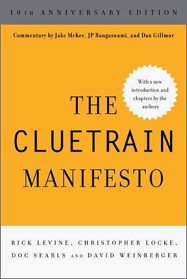Before I dive into the crux that is the title of this post, I first need to provide historical context…
In 1517, a very pious German monk named Martin Luther wrote the 95 Theses. For those not familiar, this was a document that listed 95 statements (Theses) that condemned the Pope for selling indulgences (sinners buying their way into paradise). The Pope may have been the highest ranking Man amongst the clergy…but, according to Luther, he was still just a Man. And Luther believed that only God could grant that kind of absolution.
The 95 Theses explain why selling indulgences is not only immoral, but that it is also futile. For example, Thesis #30 states “No one is sure of the integrity of his own contrition, much less of having received plenary remission.”
What made Martin Luther’s 95 Theses particularly effective is that he made use of a newly established technology: The Printing Press. Martin Luther used this machine to mass-print his document and post it across Germany. Martin Luther also opted to write the theses in German – instead of Latin – so that commoners could read them as well.
This movement would eventually lead to the Protestant Reformation, a schism that would split Christianity into different sects, including Lutherans.
 I now kindly ask that you fast-forward to 1999. Rick Levine, Christopher Locke, Doc Searles, and David Weinberger publish the Cluetrain Manifesto, a modern-day version of Martin Luther’s 95 Theses.
I now kindly ask that you fast-forward to 1999. Rick Levine, Christopher Locke, Doc Searles, and David Weinberger publish the Cluetrain Manifesto, a modern-day version of Martin Luther’s 95 Theses.
NOTE: Don’t be afraid of the word manifesto due to its sordid history. Manifestos simply outline a way of thinking, and a way of living. Technically, the Ten Commandments are a manifesto, but we typically refer to religious manifestos as “creeds.”
The premise of the Cluetrain Manifesto is that the burgeoning Internet would forever change the way the public and organizations interact. I would go so far as saying that it was an indictment against companies who ignored conversations taking place online. Here are a few of my favourite Theses from The Cluetrain Manifesto:
#1 – Markets are conversations.
#2 – Markets consists of human beings, not demographic sectors.
#3 – Conversations among human beings sound human. They are conducted in a human voice.
#15 – In just a few more years, the current homogenized “voice” of business – the sound of mission statements and brochures – will seem contrived and artificial as the language of the 18th century French Court.
#50 – Today, the org chart is hyperlinked, not hierarchical. Respect for hands-on knowledge wins over respect for abstract authority.
#65 – We’re also the workers who make our companies go. We want to talk to customers directly in our own voices, not platitudes written into a script.
#78 – You want us to pay? We want you to pay attention.
This 1999 document would essentially predict Social Media and its impact. Many organizations have embraced these values and drastically changed the landscape of our society. Citizen journalism, review websites, the sharing economy, crowdfunding, crowdsourcing, and MOOC’s (massive open online courses) are all examples of what the Cluetrain Manifesto forecasted.
I also believe that the principles outlined in the Cluetrain Manifesto should apply to the public service. We call it Open Government and its values are based on transparency, accountability, and engagement. I prefer to think that Open Government is all about creating a conversation between people and their government in an attempt to remedy a dysfunctional relationship. The purpose? To create trust between these two audiences.
As a matter of fact, I was both amazed and extraordinarily pleased when Corinne Charette at GTEC 2014 was asked the question “How do you measure the success of Open Government?” to which she answered (and I’m paraphrasing here) “Although it is difficult to measure, I believe trust is how we measure it.”
[youtube https://www.youtube.com/watch?v=oAp3jT8n6Qs]
Thing is, you can’t measure trust with traditional means. Trust is abstract; it’s an intangible, it’s innate. Perhaps the best way to describe trust is through this exchange between Jodie Foster (a scientist) and Matthew McConaughey (a priest) in the movie Contact:
Jodie Foster: For me, I need proof [that God exists].
[pause]
Matthey McConaughey: Did you love your father?
Jodie Foster: Yes…very much.
Matthew McConaughey: Prove it.
[awkward silence]
There are some things that you can’t measure, but that doesn’t necessarily mean they aren’t important. I like to say that Open Government is simply the result of “Necessity being the Mother of Invention.” We NEED to trust our government and we created Open Government as our way of rebuilding our relationship and bring trust into the equation.
There are other engaged citizens, who like me, understand that culture change of this magnitude will take time. We’re ready to work with public servants to make Open Government a reality. But, it takes two to tango…we need you (government) to open yourselves to a new way of doing things and usher in a trusting and collaborative relationship between public servants and citizens.
I now leave you with the final Theses for both Martin Luther and the Cluetrain Manifesto:
“And thus, be confident of entering into heaven through many tribulations rather than through the false security of peace. ACTS 14:22”
“We are waking up and linking to each other. We are watching. But we are not waiting.”
 Richard Pietro considers himself as an Open Government Fanboy in an attempt to create Civic Engagement as Art. Richard’s Twitter handle is @richardpietro and you can learn more about his work at MyEinsteinJob.blogspot.ca.
Richard Pietro considers himself as an Open Government Fanboy in an attempt to create Civic Engagement as Art. Richard’s Twitter handle is @richardpietro and you can learn more about his work at MyEinsteinJob.blogspot.ca.

